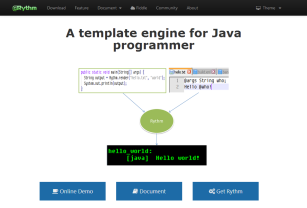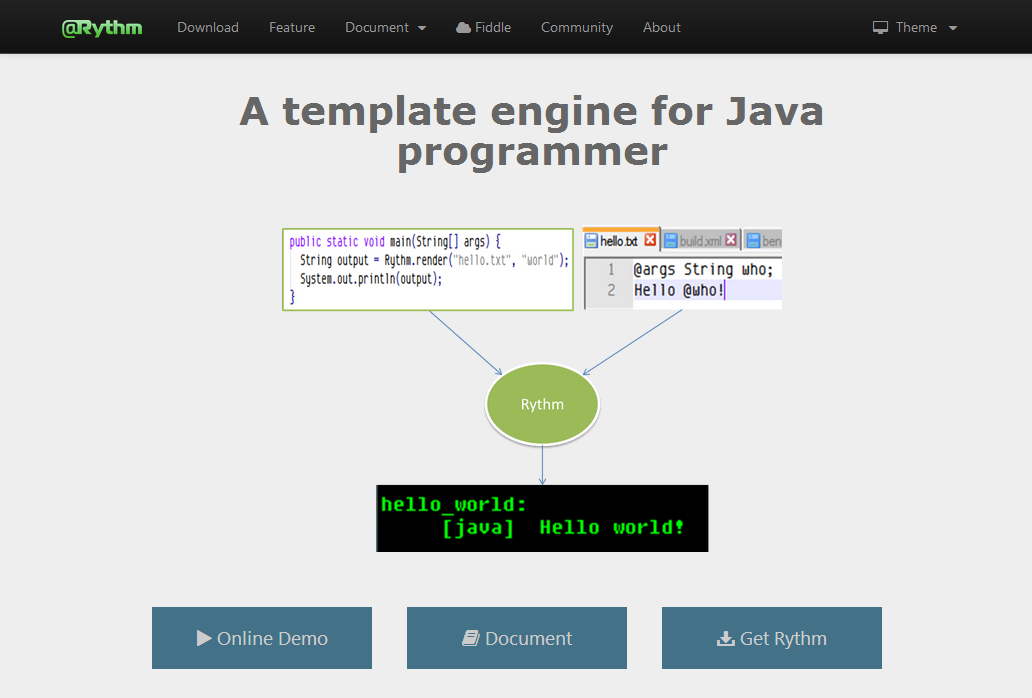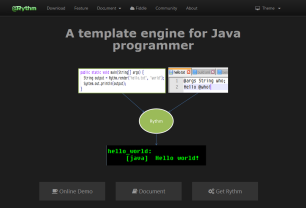Configuration Reference
This chapter documents each Rythm configuration item details. For how to configure Rythm engine and configuration rules, please refer to the developer guide
[engine]Engine configuration
This section list the core engine configurations including:
- engine.class_loader.byte_code_helper.impl
- engine.class_loader.parent.impl
- engine.file_write.enabled
- engine.load_precompiled.enabled
- engine.mode
- engine.plugin.version
- engine.precompile_mode.enabled
[engine_class_loader_byte_code_helper_impl]engine.class_loader.byte_code_helper.impl
Aliases:
- engine.class_loader.bytecode_helper
- rythm.engine.class_loader.bytecode_helper
- rythm.engine.class_loader.bytecode_helper.impl
Inject a bytecode helper implementation into Rythm in memory compilation system to allow user application specified way to locate class bytecode.
Default value: null
See also: org.rythmengine.extension.IByteCodeHelper
[engine_class_loader_parent_helper_impl]engine.class_loader.parent.impl
Aliases:
- engine.class_loader.parent
- rythm.engine.class_loader.parent
- rythm.engine.class_loader.parent.impl
Set the parent class loader to the Rythm template class loader(org.rythmengine.internal.compiler.TemplateClassLoader). In certain environment, for example, Play!framework, a specific class loader is used to manager application classes. Thus it needs to set the parent of the tempmlate class loader so that when a application class is encountered in the template source, the correct class can be located.
Default value: Thread.currentThread().getContextClassLoader()
[engine_file_write_enabled]engine.file_write.enabled
Aliases:
- engine.file_write
- rythm.engine.file_write
- rythm.engine.file_write.enabled
Enable engine to write to disk to output the generated source file and cache bytecode files. By default file write is enabled. However in certain environment, for example, Google Applicaiton Engine, file writing is forbidden. In which case you want to disable file write of the Rythm engine
Default value: true
[engine_id]engine.id
Aliases:
- rythm.engine.id
Set the ID to the engine instance. The ID been set could be later on retreived via RythmEngine.id() instance method call. This is useful when a user application instantiated multiple rythm engines, and need to distinct one from the others.
Default value: a re- prefix with another three random characters
[engine_load_precompiled_enabled]engine.load_precompiled.enabled
Aliases:
- engine.load_precompiled
- rythm.engine.load_precompiled
- rythm.engine.load_precompiled.enabled
Use this configuration to instruct the engine to load precompiled template bytecode directly instead of parsing and compiling the template source. Usually used in product mode when bytecode has already been precompiled
Default value: false
See also: engine.precompile.mode
[engine_mode]engine.mode
Aliases:
- rythm.engine.mode
Set the engine running mode. The Rythm engine could be running in either dev or prod mode.
When engine is running in dev mode, each time any form of render method is called, the engine will check if the template source file has changed since last parsing/compilation or not. If the file has been changed, then it will reload the template source file and go through the parsing/compilation process to generate new bytecodes. Otherwise, the engine will just continue to execute the existing bytecodes.
Another thing about dev mode is, when the engine.file_write is enabled, then the generated bytecodes will be persistent to home.tmp directory so that they can be quickly loaded when next time the program started.
Default value: prod
[engine_plugin_version]engine.plugin.version
Aliases:
- rythm.engine.plugin.version
Set by a plugin which built on top of Rythm engine, e.g. PlayRythm plugin which provide Rythm template engine to PlayFramework. Once set, the version number will be checked along with Rythm engine's version number against the version info written into the previously generated bytecode cache files to see if template source needs to be re-processed or not
Default value: empty String ""
[engine_precompile_mode_enabled]engine.precompile_mode.enabled
Aliases
- engine.precompile_mode
- rythm.engine.precompile_mode
- rythm.engine.precompile_mode.enabled
When engine is run in precompile mode the generated template bytecodes will be cached to precompiled directory, otherwise they will be cached to the tmp directory. The cached bytecode files can be loaded by engine when engine.load_precompiled set to true
Default value: false
See also:
[feature]Feature enable/disable
This section describe configurations that turn on/off Rythm features including:
- feature.natural_template.enabled
- feature.smart_escape.enabled
- feature.transform.enabled
- feature.type_inference.enabled
- feature.dynamic_exp.enabled
[feature_natural_template_enabled]feature.natural_template.enabled
Aliases
- feature.natural_template
- rythm.feature.natural_template
- rythm.feature.natural_template.enabled
As per wikipedia, a natural template means the template can be a document as valid as the final result, the engine syntax doesn't break the document's structure
When natural template feature is enabled, Rythm engine support put directives into comments of the context code type, thus it won't break the document's structure:
<!-- @args String who -->
<p>Hello @who.capFirst()!</p>
----------------------------------
<!-- @if (true) { -->
<p>true</p>
<!-- } -->
----------------------------------
<script>
/* @for ([1..5]) { */
alert(@_);
/* } */
</script>
Default value: false
[feature_smart_escape_enabled]feature.smart_escape.enabled
Aliases
- feature.smart_escape
- rythm.feature.smart_escape
- rythm.feature.smart_escape.enabled
When smart_escape is turned on Rythm automatically escape the expression output in a way that corresponds the the code type context. The following code shows how Rythm escape variables in a different way when it inside html context and javascript context respectively:
@args String html, String js
<p>
html: @html
js: @js
</p>
<script>
html: @html
js: @js
</script>
Default value: true
[feature_transform_enabled]feature.transform.enabled
Aliases
- feature.transform
- rythm.feature.transform
- rythm.feature.transform.enabled
When transform feature is turned on, you can use Rythm built-in transformers and user defined transformers in your template to transform expression output. In the following code, the built-in transformer format is used to transform the theDate variable output:
@args Date theDate
@theDate
@theDate.format()
@theDate.format("yyyy-MM-dd")
@theDate.format("dd/MMM/yyyy")
Default value: true
[feature_type_inference_enabled]feature.type_inference.enabled
Aliases:
- feature.type_inference
- rythm.feature.type_inference
- rythm.feature.type_inference.enabled
Being a static typed template engine, Rythm require type declaration of template arguments. When feature.type_inference is enabled, Rythm will infer the argument types using the parameters passing to the template at the first time. Meaning you don't need to use the @args directive to declare template arguments. However the feature is very restricted in usage:
- The
type_inferencefeature does not work withengine.precompile_mode. The reason is simple, there is no parameter when you try to precompile the template, thus type inference is not possible - If a parameter is passed in as
null, then the type of the corresponding argument will be inferred asjava.lang.Object
Type Inference feature with caution, please sure you fully understand the above restrictions of this feature before turning it onDefault value: false
[home]Home directories
This section describe the directories configurations used in Rythm including:
[home_template_dir]home.template.dir
Aliases:
- home.template
- rythm.home.template
- rythm.home.template.dir
Set the root directory of template source files. This configuration is used by Rythm to locate template source files if you have not configured the resource loader implementation or your configured resource loader failed to load the template specified.
Default value: The first rythm folder found in the class root of current Java process:
new File(
Thread.currentThread()
.getContextClassLoader()
.getResource("rythm")
.getFile())
[feature_dynamic_exp_enabled]feature.dynamic_exp.enabled
If this configuration is set to true, then Rythm will generate code to support Javabeans notation in template source code.
Without dynamic expression enabled, you have to write
@user.getName()
@map.get("key")
With dynamic expression enabled, you are able to write
@user.name
@map.key
[home_tmp_dir]home.tmp.dir
Aliases:
- home.tmp
- rythm.home.tmp
- rythm.home.tmp.dir
Set the root directory to output the generated template java code and byte code files. This is very helpful when running Rythm engine in dev mode, as developer can set the tmp dir as a source root folder in his/her IDE, and set breakpoint to the generated java code files to debug the template. The byte code been cached is also useful as Rythm engine will try to load the cached bytecodes directly if the template source timestamp is not changed, and thus safe the template parsing and compilation time when running in dev mode.
Default value: The __rythm folder under the system tmp directory:
new File(System.getProperty("java.io.tmpdir"), "__rythm")
[home_precompiled_dir]home.precompiled.dir
Aliases:
- home.precompiled
- rythm.home.precompiled
- rythm.home.precompiled.dir
Set the root directory to output the generated template byte code files when the engine is running under precompile mode. The generated template byte codes can be loaded in later process when the load_precompiled option is turned on
Default value: null
See also
[resource]Resource loading settings
This section documents settings pertinant to resource (template source) loading which includes:
[resource_loader_impls]resource.loader.impls
Configure resource loader implementation. When resource loader is configured, then the engine will ask it to load template source when needed.
Default value: null
[resource_name_suffix]resource.name.suffix
Aliases:
- rythm.resource.name.suffix
Set suffix (e.g. “.rythm“) of the template source files. Note this setting is favor by Rythm's built-in file resource loader. However when the resource loader is configured, it is up to the user implementation to decide whether favor this setting or not.
Default value: empty string ""
When you use the name suffix you can still have the regular file extensions. For example, suppose your name suffix is .rythm, the following names are all valid rythm template soure file names:
foo.html.rythmfoo.js.rythmfoo.rythm
The first two file names are more preferred as they keep the file type info in the .html and .js extension. Rythm engine can use them to deduct the code type of the template.
.html, .js, .json etc. As they could be used to identify the code type of the template[codegen]Code generation options
This section describe configurations impact code generation including:
[codegen_byte_code_enhancer_impl]codegen.byte_code_enhancer.impl
Aliases
- codegen.byte_code_enhancer
- rythm.codegen.byte_code_enhancer
- rythm.codegen.byte_code_enhancer.impl
Use this configuration to setup byte code enhancer which further process the byte code generated out of the template source. For example the PlayRythm plugin use this configuration to apply play's property enhancement on the template class byte code.
Default value: null
See also: org.rythmengine.extension.IByteCodeEnhancer
[codegen_compact_enabled]codegen.compact.enabled
Aliases:
- codegen.compact
- rythm.codegen.compact
- rythm.codegen.compact.enabled
When this option is turned on Rythm will compact template output by removing extra white space and line breaks.
Default value: true
[codegen_source_code_enhancer_impl]codegen.source_code_enhancer.impl
Aliases:
- codegen.source_code_enhancer
- rythm.codegen.source_code_enhancer
- rythm.codegen.source_code_enhancer.impl
Set the source code enhancer implementation to Rythm code generation system to allow user application inject imports, source codes and template arguments to the generated java source file.
Default value: null
[render]Render options
This section documents options used at template rendering time including:
[render_listener_impl]render.listener.impl
Aliases:
- render.listner
- rythm.render.listner
- rythm.render.listner.impl
Configure the render listener. The listener allows user plugin application specific logics on different rendering events, including render, post render, invoke, post invoke.
Default value: null
[render_exception_handler_impl]render.exception_handler.impl
Aliases:
- render.exception_handler
- rythm.render.exception_handler
- rythm.render.exception_handler.impl
Configure the render exception handler. The handler method is invoked when exception encountered while executing a template. For example, PlayRythm plugin use this handler to process play's specific Render exception so that template author can call controller action directly from template.
Default value: null
[built_in]Built-ins
This section documents options to turn on/off built-in feature implementations including:
[built_in_code_type_enabled]built_in.code_type.enabled
Aliases
- built_in.code_type
- rythm.built_in.code_type
- rythm.built_in.code_type.enabled
Enable built-in code type implementation. The built-in code type implements common code types including html, xml, javascript, css, csv and JSON. Usually you should not turn off this option.
Default value: true
[built_in_transformer_enabled]built_in.transformer.enabled
Aliases:
- built_in.transformer
- rythm.built_in.transformer
- rythm.built_in.transformer.enabled
Enable built-in transformers. The built-in transformers provides commonly used utilities including different escape schemes, String manipulation, date and currency format, i18n and list join etc.
Default value: true
[default]Defaults
This section documents default settings including:
[default_code_type_impl]default.code_type.impl
Aliases:
- default.code_type
- rythm.default.code_type
- rythm.default.code_type.impl
Specify the default code type. You can set this configuration when you are using Rythm in a specific senario. For example:
- Case one, use Rythm to generate html pages in web project, set default code type to
- Case two, use Rythm to generate csv files, set default code type to
Default value: org.rythmengine.extension.ICodeType.DefImpl.RAW
[default_cache_ttl]default.cache_ttl
Aliases:
- rythm.default.cache_ttl
Specify the default timeout in second for Rythm's cache service. This option is effective only when cache is enabled and cache service is not set to user implementation
Default value: 60 * 60 (1 hour)
[cache]Cache settings
This section documents cache related settings including:
[cache_enabled]cache.enabled
Aliases:
- cache
- rythm.cache
- rythm.cache.enabled
Enable/disable cache service. When cache service is enabled, template author can use @cache to direct engine to cache certain part of rendered content.
Default value: false
[cache_service_impl]cache.service.impl
Aliases
- cache.service
- rythm.cache.service
- rythm.cache.service.impl
Set the cache service implementation. This configuration is only effective when cache is enabled.
Default value: Rythm's built-in simple cache service
[cache_duration_parser_impl]cache.duration_parser.impl
Aliases
- cache.duration_parser
- rythm.cache.duration_parser
- rythm.cache.duration_parser.impl
Set the duration parser implementation. This configuration is only effective when cache is enabled.
Default value: Rythm's built-in duration parser
[cache_prod_only_enabled]cache.prod_only.enabled
Aliases
- cache.prod_only
- rythm.cache.prod_only
- rythm.cache.prod_only.enabled
When this configuration is set to true, then cache will only be effective when Rythm is running in prod mode. Disable cache at dev mode makes it convenient for development and debugging.
Default value: true
[log]Log settings
This section documents log settings including:
- log.enabled
- log.factory.impl
- log.source.java.enabled
- log.source.template.enabled
- log.time.render.enabled
[log_enabled]log.enabled
Aliases:
- log
- rythm.log
- rythm.log.enabled
Enable/disable logging in Rythm.
Default value: true
[log_factory_impl]log.factory.impl
Aliases:
- log.factory
- rythm.log.factory
- rythm.log.factory.impl
Configure log factory implementation.
Default value: the rythm built-in org.rythmengine.logger.JDKLogger.Factory
[log_source_java_enabled]log.source.java.enabled
Aliases:
- log.source.java
- rythm.source.java
- rythm.source.java.enabled
Enable/disable print relevant section of generated java source code when exception encountered.
Default value: true
[log_source_template_enabled]log.source.template.enabled
Aliases:
- log.source.template
- rythm.source.template
- rythm.source.template.enabled
Enable/disable print relevant section of template source code when exception encountered.
Default value: true
[log_time_render_enabled]log.time.render.enabled
Aliases:
- log.time.render
- rythm.time.render
- rythm.time.render.enabled
Enable/disable log template render time using DEBUG level
Default value: false
[i18n]I18N settings
This section documents i18n relevant configurations including:
[i18n_locale]i18n.locale
Aliases:
- rythm.i18n.locale
Set the locale which impact the output of @i18n built-in function, varieties of format built-in transformers etc.
The locale set with this configuration can be overwritten by @locale directive when executing the template.
Default value: java.util.Locale.getDefault()
Set i18n.locale by API:
Map<String, Object> conf = ...
Locale locale = new Locale("en", "AU");
conf.put("i18n.locale", locale);
// or
conf.put("i18n.locale", "cn_ZH");
...
Set i18n.locale in properties file:
rythm.i18n.locale=cn_ZH
# rythm.i18n.locale=en
[i18n_message_sources]i18n.message.sources
Aliases:
- rythm.i18n.message.sources
Set message sources, should be a String separated by “,“, for example, "format,exception,window". Note the setting is used by Rythm's default i18n.message.resolver implementation. If user application configure the customized message resolver, it is up to that message resolver implementation to decide whether use this configuration or not.
Default value: "messages"
[i18n_message_resolver_impl]i18n.message.resolver.impl
Aliases:
- i18n.message.resolver
- rythm.i18n.message.resolver
- rythm.i18n.message.resolver.impl
Configure i18n message resolver which support i18n message lookup.
Default value: org.rythmengine.extension.II18nMessageResolver.DefaultImpl
[sandbox]Sandbox settings
This section documents sandbox relevant configurations including:
- sandbox.security_manager.impl
- sandbox.timeout
- sandbox.restricted_class
- sandbox.allowed_system_properties
- sandbox.thread_factory.impl
- sandbox.pool.size
To understand sandbox concept and check how to use sandbox, please click here.
[sandbox_security_manager_impl]sandbox.security_manager.impl
Aliases:
- sandbox.security_manager
- rythm.sandbox.security_manager
- rythm.sandbox.security_manager.impl
Set the security manager for sandbox rendering. A security manager guard the running system from being breaking by mal codes in the template source. For example, @{Runtime.exit(0);}
Default value: org.rythmengine.sandbox.RythmSecurityManager
[sandbox_timeout]sandbox.timeout
Aliases:
- rythm.sandbox.timeout
Set timeout in milliseconds for sandbox rendering thread. The timeout setting gives a chance for the system to exit a template executing if it takes too much time.
Default value: 2000 (2 seconds)
[sandbox_restricted_class]sandbox.restricted_class
Aliases:
- rythm.sandbox.restricted_class
Configure the classes or packages that cannot be referenced in a template when running in sandbox mode. The configuration should be a String contains class/package names separated by “,“.
Default value: empty string ""
- org.rythmengine.Rythm
- org.rythmengine.RythmEngine
- java.io
- java.nio
- java.security
- java.rmi
- java.net
- java.awt
- java.applet
[sandbox_allowed_system_properties]sandbox.allowed_system_properties
Aliases:
- rythm.sandbox.allowed_system_properties
Specify the system properties in a string separated by , that can be accessed from the template source code when running in sandbox mode. If the template source in anyway accessing java.lang.System.properties for properties not specified in this configuration then Rythm will throw out an exception.
Default value is a string composed by the following items separated by ,:
- java.io.tmpdir
- file.encoding
- user.dir
- line.separator
- java.vm.name
- java.protocol.handler.pkgs
- suppressRawWhenUnchecked
[sandbox_thread_factory_impl]sandbox.thread_factory.impl
Aliases:
- sandbox.thread_factory
- rythm.sandbox.thread_factory
- rythm.sandbox.thread_factory.impl
Set the thread factory that creates template executing thread when running in sandbox mode. When this setting is not configured by user application, Rythm will handle the sandbox executing thread management
Default value: null
[sandbox_pool_size]sandbox.pool.size
Aliases:
- rythm.sandbox.pool.size
Set the maximum number of sandbox executing threads in the thread pool.
sandbox.pool.size setting or notDefault value: 10
[ext]Extensions
This section documents developer extension configurations
Aliases:
- rythm.transformer.udt
[ext_transformer]User defined transformers
Register user defined transformers. This configuration support different type of parameter:
- An array of class name or
Classinstance - A list of class name or
Classinstance - A
Classinstance - A string of class names separated by
,or space
Except the last type, all other types can only be used configured with API call. The last one can be used by both via API or via properties file.
Configure transformer.udt via API call:
Map<String, Object> conf = ...
// configure it with array of classes
Class[] udts = new Class[]{MyTrans1.class, MyTrans2.class, ...};
conf.put("transformer.udt", udts);
// configure it with list of classes
List<Class> lc = ...
lc.add(MyTrans1.class);
lc.add(MyTrans2.class);
// configure it with one class instance
conf.put("transfomer.udt", MyTrans1.class);
// configure it with string
conf.put("transformer.udt", "MyTrans1.class, MyTrans2.class");
Configure transformer.udt via properties file or system properties:
transfomer.udt=MyTrans1.class,MyTrans2.class,...



